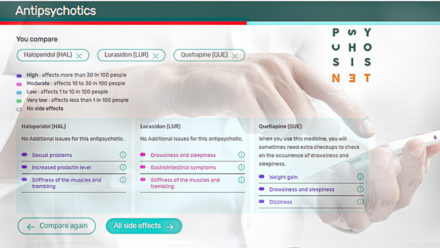
It is well-known that antipsychotics often cause side effects, but there is less attention for the fact that these medicines can also cause type 2 diabetes, obesity and disrupted fat metabolism. These problems combined are also known as the metabolic syndrome.
Developing metabolic syndrome from taking antipsychotics is not as rare as people often think. Therefore it deserves extra attention.
What is metabolic syndrome?
Metabolic syndrome is a combination of four common conditions: high blood pressure, diabetes, high cholesterol and obesity. When you have at least three of these four issues, this can be described as metabolic syndrome. Other terms for it is insulin resistance syndrome, or syndrome X.
It essentially is a problem with metabolism (converting food into energy), caused by a negative balance between food intake and physical activity. This disturbs the proper metabolic functioning of the body, which can cause various disorders. The main consequence is a higher risk of cardiovascular diseases.
Antipsychotics and metabolic syndrome
Especially clozapine and olanzapine are known for increased risk of metabolic side effects such as diabetes and obesity. So it is important to have your health checked every once in a while when using this medication.
Besides monitoring your weight and length, your abdominal circumference and blood pressure, you also need regular blood value tests. The most important blood values to test are: fasting glucose, LDL, HDL and total cholesterol and triglycerides (fats). These values should be tested before starting the medication. Again after six weeks and after three months. And from then on once a year.
Some antipsychotics can increase the levels of sugar, fats and/or cholesterol in your blood without leading to immediately noticeable problems. Therefore it is important to do regular blood tests when using antipsychotics.
Blood tests are particularly important when you:
- have rapidly gained quite a lot of weight;
- have family members with diabetes and/or cardiovascular disease;
- eat irregularly, too little or unhealthy;
- do not exercise (enough);
- use drugs, alcohol and/or tobacco.
Treatment of metabolic syndrome
The metabolic syndrome is caused largely by an unhealthy life style, while use of medication such as antipsychotics further enlarge the risk of complications. More exercise and a healthier diet are therefore the most important ‘interventions’ for treatment. Usually, even a small loss of weight means a significant increase in health and reduced change of cardiovascular diseases.
Next to a healthier diet and more exercise, treatment of metabolic syndrome should also include regular health checkups and blood tests by your general practitioner. Switching to another type of medicine might also be a good idea in some cases.
External websites:
- Medline Plus Information about specific medicines and patient leaflet
- Mind.org on info about driving and medication




